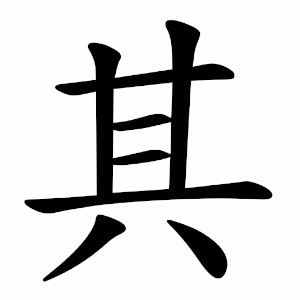其
- that;
- those;
- his, her, its;
- it (pronoun);
Also used as an auxiliary or function word in Classical Chinese.
Etymology
其 is originally a pictograph depicting a winnowing basket (키) — a tool used for separating grain from chaff.
The earliest form shows crossed strips woven together, representing the bamboo structure of the winnowing basket.
From this object meaning “basket,” the character was later borrowed (假借) for its pronunciation (기 / qí) to serve as a function word (“that, its”) as early as the Shang dynasty (商代).
Because its original pictorial meaning was lost early, the Chinese later created:
㠱 (나라이름 기) — adding 己 (기) for phonetic precision.
箕 (키 기) — adding 竹 (죽) to clarify the meaning “winnowing basket.”
Thus, 其 → 㠱 → 箕 represent the historical process from the pictograph’s original meaning (object) to a derived sound loan (pronoun).
Usage in Korean
其他 (기타) — the others, other things
其中 (기중) — among them, within it
其次 (기차) — next, secondly
其實 (기실) — in fact, actually
其後 (기후) — afterward, later
其人 (기인) — that person
其所 (기소) — that place, where
其然 (기연) — indeed so; correct
其樂 (기락) — his joy; the joy thereof
Words that derived from 其
Additional notes
In pre-Qin and Han texts, 其 appears extremely frequently — functioning as a universal third-person or neutral demonstrative, comparable to English he / she / it / that / those.
It often precedes nouns or verbs to indicate relation or possession.
In modern Chinese, 其 survives mainly in formal written language or idioms.
Spoken forms instead use 他 / 她 / 它 for “he / she / it.”
However, 其 remains productive in compound words (e.g., 其他, 其次, 其中).
In Japanese and Korean:
Korean (기): used in academic Sino-Korean vocabulary (e.g., 其後 “기후,” 其他 “기타”).
Japanese (その / それ): though outside the Jōyō kanji list, it was used historically in texts as 其ノ or 其レ to mean “that” or “it.”
Usage in Classical Chinese:
As a pronoun
人而不仁,如禮何?其何以禮?
“If a person lacks benevolence, what use is ritual to him?”
(Analects, 3:3)
As a possessive
天行健,君子以自強不息;地勢坤,君子以厚德載物。其德厚矣。
“The movement of Heaven is strong; the noble man strives ceaselessly.
The virtue of Earth is vast; the noble man supports others with his virtue.”
As an adverb of emphasis
其必然矣。 — “Surely it must be so.”
